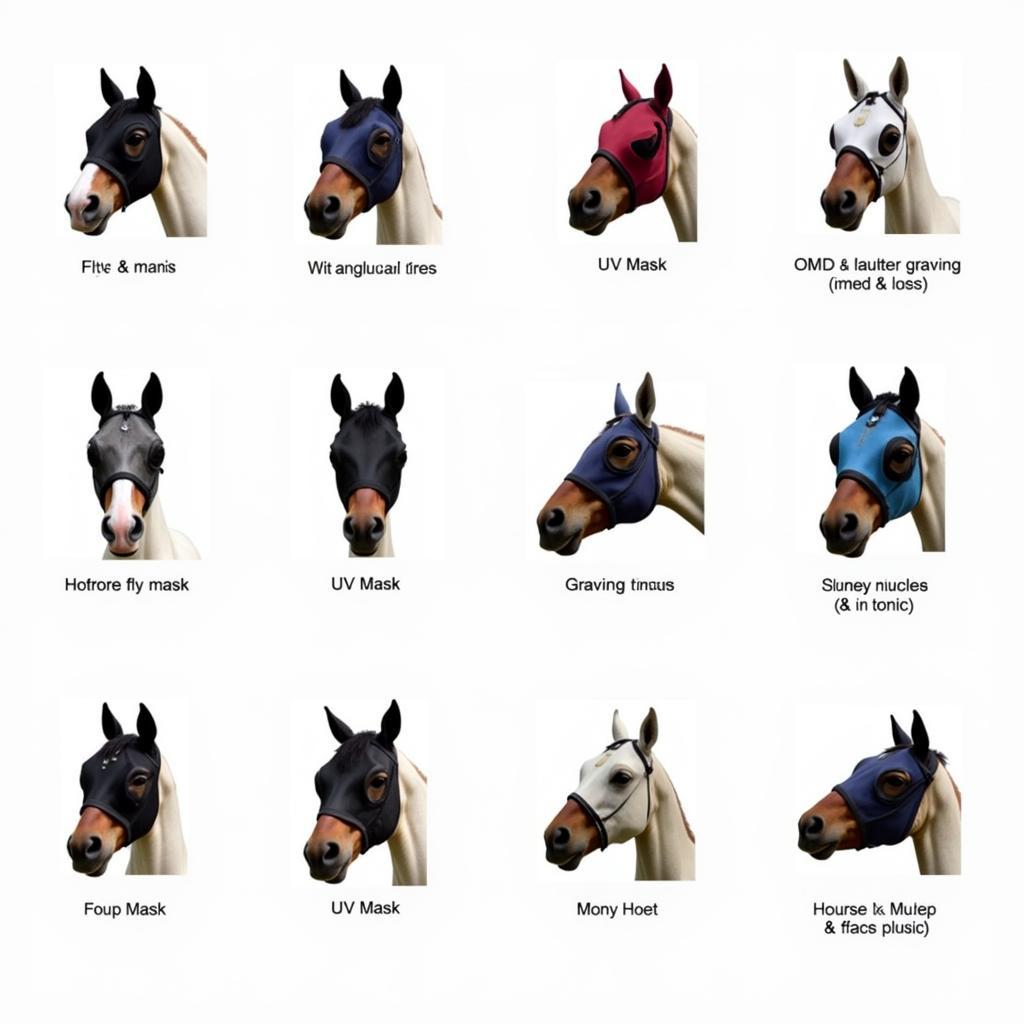A Face Mask For Horses is more than just a fashion statement. It’s a vital piece of equipment that can protect your equine companion from a variety of environmental hazards, insects, and even the sun’s harmful UV rays. Choosing the right mask can significantly impact your horse’s comfort and well-being.
Why Your Horse Might Need a Face Mask
Horses, like humans, are susceptible to various irritants and health issues that a face mask can help mitigate. Fly masks, for instance, are crucial during the summer months to protect your horse’s sensitive eyes and face from pesky flies and other biting insects. UV protection is also a critical factor, especially for horses with pink skin or light-colored coats who are more prone to sunburn. Some masks even offer protection against dust and debris, ideal for horses in dry, dusty environments or those with respiratory sensitivities. Beyond protection, face masks can also be therapeutic, aiding in healing after injuries or surgeries around the face and eyes.
Choosing the right face mask can be a daunting task, considering the variety of styles, materials, and features available. Understanding the different types of masks and their specific purposes is essential for making an informed decision that best suits your horse’s needs.
Types of Face Masks for Horses
There are several types of face masks designed for various purposes, each offering unique benefits. Let’s explore some of the most common types:
Fly Masks
As their name suggests, fly masks are designed to protect horses from flies, gnats, mosquitoes, and other flying insects. They are typically made of mesh material that allows for visibility while keeping insects at bay. Some fly masks offer UV protection, providing a dual benefit. Check out our article on the best fly masks for horses for in-depth reviews and recommendations.
UV Masks
These masks are specifically designed to shield your horse’s delicate facial skin from the harmful effects of the sun’s ultraviolet rays. They are often made from tightly woven fabrics that block UV radiation while still allowing for airflow. For more information on UV protection for your horse, visit our page on uv fly mask horse.
Grazing Muzzles
While not strictly a “face mask,” grazing muzzles restrict a horse’s intake of grass while allowing them to graze freely. This can be essential for managing weight and preventing laminitis in horses prone to overeating.
Compression Masks
compression mask for horses can help reduce swelling and inflammation after injuries or surgeries. They provide gentle compression and support to the facial area, promoting healing and reducing discomfort.
 Different Types of Horse Face Masks: A Comparison
Different Types of Horse Face Masks: A Comparison
Choosing the Right Face Mask for Your Horse
Selecting the appropriate face mask depends on various factors, including your horse’s individual needs, the environment, and the intended purpose. Consider the following:
- Size and Fit: A properly fitting mask is crucial for comfort and effectiveness. Measure your horse’s face carefully and consult the manufacturer’s sizing chart.
- Material: Different materials offer varying levels of breathability, durability, and protection.
- Features: Consider features like ear covers, nose flaps, and UV protection based on your horse’s needs.
- Durability: A quality mask should withstand regular wear and tear.
“A well-fitting mask is essential,” says Dr. Emily Carter, DVM, specializing in equine medicine. “A mask that’s too tight can cause rubbing and discomfort, while a loose mask can easily slip off or allow insects to enter.”
Caring for Your Horse’s Face Mask
Proper care and maintenance will extend the life of your horse’s face mask. Regularly clean the mask with mild soap and water, ensuring it’s thoroughly dry before putting it back on your horse. Inspect the mask for any signs of wear and tear, replacing it as needed.
Conclusion
Face masks for horses are a valuable investment in your horse’s health and comfort. By understanding the different types of masks available and choosing the right one for your horse’s needs, you can provide crucial protection from insects, UV rays, and other environmental hazards. Remember to choose a mask that fits well, is made of durable materials, and offers the specific features your horse requires. For more information on eye protection for horses, explore our page on eye coverings for horses. Don’t forget to check out our guide on what is the best fly spray for horses for additional protection against pesky insects.
FAQ
- How often should I clean my horse’s face mask?
- What are the signs of a poorly fitting face mask?
- Can my horse wear a face mask overnight?
- Are there face masks for horses with sensitive skin?
- How do I measure my horse for a face mask?
- What are the benefits of using a UV face mask for horses?
- Can a face mask help with my horse’s eye allergies?
For further information or assistance with any horse-related questions, please contact us. We have a 24/7 customer support team ready to help. Call us at 0772127271, email us at [email protected], or visit our location at QGM2+WX2, Vị Trung, Vị Thuỷ, Hậu Giang, Việt Nam.